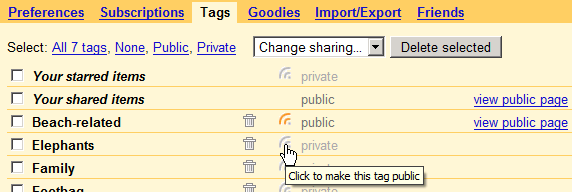Despite the public relations setbacks, Google and Facebook should get credit for attempting to make forays into online realms that scare up all sorts of ethical issues and privacy concerns.
A month after Facebook got pilloried for sharing users’ online activities with its network, Google is taking flak for its Reader aggregation application. For the last two weeks, Reader has been linked with the Google Talk instant messaging application to share items to people across both apps.
People quickly objected after they realized co-workers, relatives and friends in their Talk contact lists could see all of the content they’ve tucked away in Reader.
That is the tricky part of an all-access application such as Talk. I may send my friend a link to a review of a movie I want to see or something I want to buy, but I wouldn’t necessarily send the same to my boss. Unless you took the steps to switch off the sharing in Reader, anyone in Talk could see your stuff.
Reader users flamed Google and/or expressed genuine concern: “There should be an ‘opt in’ option where me and my friend mutually agree that we want to share with each other,” wrote Reader user kronicfatigue Dec. 14, just hours after the feature was unveiled. “Otherwise, I’m not going to feel comfortable tagging items.”
Google two days ago outlined how to navigate around the sharing process, but it seems like a pain:
People shouldn’t be motivated to do something that will keep something unpleasant from happening. That takes the fun out of the service.
People are calling for more granular privacy controls and a Google spokesperson told me the Google engineers are working toward that end. What will these controls be like? Opt-in? If opt-in falls under that category, I’m not sure that is the answer either. Who really opts in unless they see significant value behind it? What is the motivation?
Another granular control might just be to turn it off entirely.
People wanted the same from Beacon and they got it, first with opt-in, and then the ability to turn off activity sharing with friends entirely. What percentage of people is opting in to allow their online transaction stories to be shared with others in the News feed? What percentage is turning it off entirely?
If 75 percent or more people are shutting it off, then it’s a failure. But at least Facebook is pushing the ad revenue-generating envelope for social networks. Google, too, is striving for greater things with Reader, although there really is no money being generated from that in the short term.
It’s one thing to fail in creating the technology, and to patch buggy code, but now programmers have to put themselves in the populace’s shoes to figure out how to institute something that is both technologically and socially sound. Is it me, or does this task seem herculean?
Reader-Talk is an attempt by Google to break the walled gardens between its software. Facebook was social from the start; Google Reader is knocking from the backdoor. Google is trying to figure out social constructs of applications on its own before it distributes these in OpenSocial, the company’s ultimate social destination.
To that end, I asked the Google spokesperson if the company links Reader and its newfangled sharing capabilities to OpenSocial. The answer was a quick “no.”
That didn’t give me much so I asked if Google had plans to forge such a link. The response was more interesting. After a pause, the spokesperson said, “We don’t really have much specific to share in terms of that road map.”
The pause is the giveaway. So, believe that Google is working on that, which is why we’re seeing the sharing in Reader now. Google is clearly baking the cake at home for the OpenSocial party in 2008.
Speaking of parties and 2008, in case this is my last post of 2007, Happy New Year.
